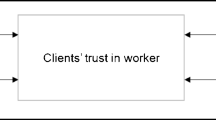Abstract
Accurate personal information provision is one of the most important determinants of the commercial development of the Web. However, consumers are usually reluctant to provide personal information or tend to provide false information online because of their concern about privacy violation risks. We employ a 2× 2× 2 experimental design to examine the effects of reputation, privacy notices, and rewards on online consumer behavior in volunteering two types of personal information on the Internet: demographic information and personally identifiable information. We discuss the theoretical and practical implications of the findings.
Similar content being viewed by others
References
Alexander, C. S., & Becker, H. J. (1978). The Use of Vignettes in Survey Research. Public Opinion Quarterly, 42, 93–104.
Anderson, E., & Weitz, B. (1989). Determinants of Continuity in Conventional Industrial Channel Dydads. Marketing Science, 8, 310–323.
Bolton, G. E., Katok, E., & Ockenfels, A. (2004). How Effective Are Electronic Reputation Mechanisms? An Experimental Investigation. Management Science, 50, 1587–1602.
Culnan, M. J., & Armstrong, P. K. (1999). Information Privacy Concerns, Procedural Fairness and Impersonal Trust: An Empirical Investigation. Organization Science, 10, 104–115.
Culnan M. J., & Robert J. B. (2003). Consumer Privacy: Balancing Economic & Justice Considerations. Journal of Social Issues, 59(2), 323–342.
Das S. et al. (2003). The Effect of interpersonal Trust, Need for Cognition, and Social Loneliness on Shopping, Information Seeking and Surfing on the Web. Marketing Letters, 14, 185–202.
Dommeyer, C. J., & Gross, B. (2003). Consumer Knowledge, Awareness, and Use of Privacy Protection Strategies. Journal of Interactive Marketing, 17(2), 34–51
Doney, P. M., & Cannon, J. P. (1997). An examination of the nature of trust in buyer-seller relationship. Journal of Marketing, 61, 35–51.
Finch, J. (1987). The Vignette Technique in Survey Research. Sociology, 21, 105–114.
Ganesan, S. (1994). Determinants of long-term orientation in buyer-seller relationships. Journal of Marketing, 58, 1–19.
Gefen, D., Karahanna, E., & Straub, D. W. (2003). Trust and TAM in Online Shopping: An Integrated Model. MIS Quarterly, 27(1), 51–90
James G. (2004). Dumbing Down Democracy: Trends in Internet Regulation, Surveillance and Control in Asia, Paper presented at the Centre for Southeast Asian Studies Seminar series, Monash Asia, Institute, Monash University on 11 March 2004.
Harris Interactive (2001). Consumer Privacy Attitudes and Behaviors for the Privacy Leadership Initiative (PLI). Harris Interactive.
Henderson, S. C., & Snyder, C. A. (1999). Personal Information Privacy: Implications for MIS Managers. Information & Management, 36, 213–220.
Hill, M. (1997). Research Review: Participatory Research with Children. Child and Family Social Work, 2, 171–183.
Hoffman, D. L., Novak, T. P., & Peralta, M. (1999). Building Consumer Trust Online. Communications of the ACM, 42(4), 80–85.
Hann, I. H., Hui, K.-L., Lee, T. S., Png, I. P. L. (2003). The Value of Online Information Privacy: An Empirical Investigation. Working Paper at WUSTL.
Jarvenpaa, S. L., & Tractinsky, N. (1999). Consumer trust in an Internet store: A cross-cultural validation. Journal of Computer-Mediated Communication, 5.
Jupiter Media Matrix. (2002) March Consumer Privacy Survey. Retrieved March 10. 2003from Http://retailindustry.about.com/library/b1/02q2/b1_jmm060302.htm
Laufer, R. S., & Wolfe, M. (1977). Privacy as a Concept and a Social Issue: A Multidimensional Developmental Theory. Journal of Social Issues, 33, 22–42.
Long, G., Hogg, M. K., Hartley, M., & Angold, S., (1999) Relationship marketing and privacy. Exploring the thresholds, Journal of Marketing Science, Applied Marketing Science, 5, 4–20.
Lwin M. O., & Williams, J. D. (2003). A Model Integrating the Multidimensional Developmental Theory of Privacy and Theory of Planned Behavior to Examine Fabrication of Information Online. Marketing Letters, 14, 257–272
Milne, G. R. & Gordon, M. E. (1993). Direct Mail Privacy-Efficiency Trade-Offs within an Implied Social Contract Framework. Journal of Public Policy & Marketing, 12, 206–215
Milne, G. R. (1997). Consumer Participation in Mailing Lists: A Field Experiment, Journal of Public Policy and Marketing, 16, 298–309.
Milne, G. R., & Boza, M. (1999). Trust and concern in consumers' perceptions of marketing information management practices. Journal of Interactive Marketing, 13, 5–24
Milne, G. R., & Culnan, M. J. (2004). Strategies for Reducing Online Privacy Risks: Why Consumers Read (Or Don't Read) Online Privacy Notices. Journal of Interactive Marketing, 18(3), 15–29.
Mitchell & Vincent-Wayne. (1999). Consumer Perceived Risk: Conceptualisations and Models. European Journal of Marketing, 33, 163–195.
Moorman, Z. G. & Deshpandé, R. (1992). Relationships Between Providers and Users of Market Research: The Dynamics of Trust within and Between Organizations. Journal of Marketing Research, 29, 314–328.
Nowak, G. J., & Phelps, J. (1992). Understanding Privacy Concerns. Journal of Direct Marketing, 6(4), 28–39.
Phelps, J., Nowak, G., & Ferrell, E. (2000). Privacy concerns and consumer willingness to provide personal information. Journal of Public Policy & Marketing, 27–41.
Roboff, G., & Charles, C. (1998). Privacy of Financial Information in Cyberspace: Banks Addressing What Consumers Want. Journal of Retail Banking Services, 20, 51–56.
Shapiro, S. P. (1987). The Social Control of Impersonal Trust. American Journal of Sociology, 93(3), 623–658.
Stewart, K. J. (2003). Trust Transfer on the World Wide Web. Organization Science, 14(1), 5–17.
Sultan, F., & Mooraj, H. A. (2001). Designing a Trust-Based e-Business Strategy, Marketing Management, 10(4), 40–46.
Y. Xia et al. (2003). Consumer Preference for Commercial Web Site Design: An Asia-Pacific Perspective. Journal of Consumer Marketing, 20(1), 10–27.
Zhang, Y., Wang, C. L., & Chen, J. (2000). Consumers' Responses to Web-based Data Collection Efforts and Factors Influencing the Responses. Journal of International Marketing and Market Research. 25, 115–123
Author information
Authors and Affiliations
Corresponding author
Rights and permissions
About this article
Cite this article
Xie, E., Teo, HH. & Wan, W. Volunteering personal information on the internet: Effects of reputation, privacy notices, and rewards on online consumer behavior. Market Lett 17, 61–74 (2006). https://doi.org/10.1007/s11002-006-4147-1
Issue Date:
DOI: https://doi.org/10.1007/s11002-006-4147-1




